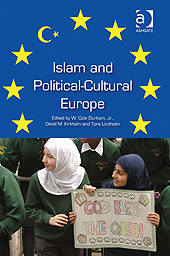Islam and Political-Cultural Europe

Islam and Political-Cultural Europe
W. Cole Durham Jr., David M. Kirkham, Tore Lindholm, eds.
Ashgate 2012
Islam and Political-Cultural Europe identifies the sometimes confusing and often contentious new challenges that arise in daily life and institutions as Islam settles deeper into Europe. Critiquing past and recent assimilation efforts in the fields of education, finance, and security, the contributors offer prospective solutions to diverse contemporary problems. Exploring the interactions of Muslim, Christian and secular cultures in the context of highly pluralized contemporary European societies, this book offers a valuable tool for those within and outside Europe seeking to understand the far-reaching implications of combining cultures, the struggles of the Muslim-Christian-secular transition, and the progress which the future promises.
Introduction, David M. Kirkham;
Part I Islam and Legal and Political Culture in European Society: An Overview: Liberal secularism and European Islam: a challenge to Muslims and non-Muslims, Heiner Bielefeldt; Muslim minorities and democracy: battle of memories versus genuine integration, Guy Haarscher.
Part II Law and Politics: Country Case Studies: Islam and the law in Germany and Europe, Mathias Rohe; Muslims in Belgium, Rik Torfs; Private international law: when choice of law principles invoke Islamic rules – a French perspective, Isabelle Barrière Brousse.
Part III Education and Finance: The training of imams, Silvio Ferrari; Secularism, schools, and religious affiliation: for a demanding account of Law no. 2004-228 of March 15, 2004, Alain Garay; Religion, education and the Turkish Constitution: a critical assessment, Levent Köker; Islamic religious education in Bosnia and Herzegovina: between coexistence and segregation, Önder Çetin; Islamic banking and finance: transplantable models from Malaysia to the EU?, Stefan Messmann.
Part IV Extremism and Security: The Danish cartoons crisis revisited, Lisbet Christoffersen; Islam, Muslims and Islamism: on culturalization and securitization, Petra Weyland; Countering extremist ideological foundations for terrorism: some reflections, Sharyl Cross.
Bibliography; Index.
ABOUT THE EDITORS:
W. Cole Durham, Jr. is the director of the International Center for Law and Religion Studies and the Susa Young Gates University Professor of Law at the J. Reuben Clark Law School, Brigham Young University. Professor Durham has served for many years as a member of the OSCE/ODIHR Advisory Council on Freedom of Religion or Belief, and is the president of the Milan-based International Consortium for Law and Religion Studies. A graduate of Harvard College and Harvard Law School, Professor Durham has been heavily involved in comparative constitutional law and religion-state relations throughout his career. He has published widely on comparative law and has served as secretary of the American Society of Comparative Law and as the chair of both the Comparative Law Section and the Law and Religion Section of the American Association of Law Schools. He is a member of several U.S. and international advisory boards dealing with religious freedom and church-state relations.
David M. Kirkham, Ph.D., J.D., is Senior Fellow for Comparative Law and International Policy and senior advisor on Europe at the Brigham Young University Law School International Center for Law and Religion Studies, and BYU professor of political science. Prior to 2007, David served as Associate Dean and Professor of International Politics and Democratic Studies at the George C. Marshall European Center for Security Studies in Garmisch-Partenkirchen, Germany. He has also served as Director of International History and Associate Professor of History at the United States Air Force Academy, as a Senior Humanitarian Affairs Officer at the United Nations Office for the Coordination of Humanitarian Affairs in Geneva, and as an international negotiator for the US government in Europe and Africa. His teaching and previous publications address international ethics and human rights, constitutionalism, democratic revolutions, the United Nations, international humanitarian relief, and the global challenges posed by ideological extremism.
Tore Lindholm is an emeritus professor (philosophy) at the Norwegian Centre for Human Rights, University of Oslo and board member of the Oslo Coalition on Freedom of Religion or Belief and of the Human Rights Committee of the Church of Norway. His research interests focus on (1) the grounds for embracing universal human rights and in particular the right to freedom of religion or non-religious conviction, and (2) the two-way traffic between human rights and religions (in particular with respect to Islam and Muslims). He co-edited the volume Facilitating Freedom of Religion or Belief (2004). He edited a book on Abdullahi An-Na’im’s Islamic reform thinking, Islamic Law Reform and Human Rights: Challenges and Rejoinders (1993) and just finished Religious Commitment and Social Integration (2012), a pilot study about Pakistani immigrants living in Oslo.
This title is also available as an eBook, eISBN 978-1-4094-5300-0.